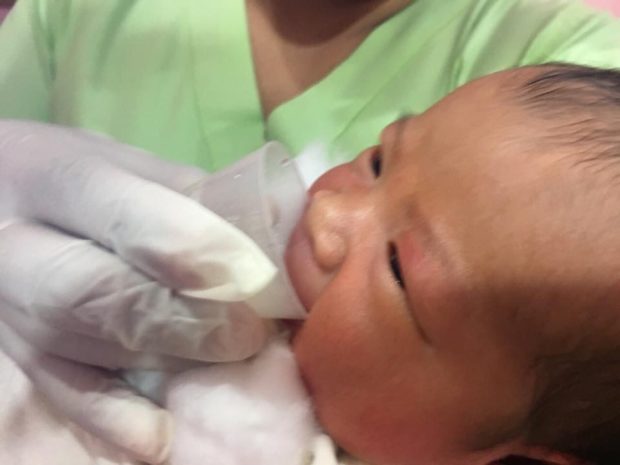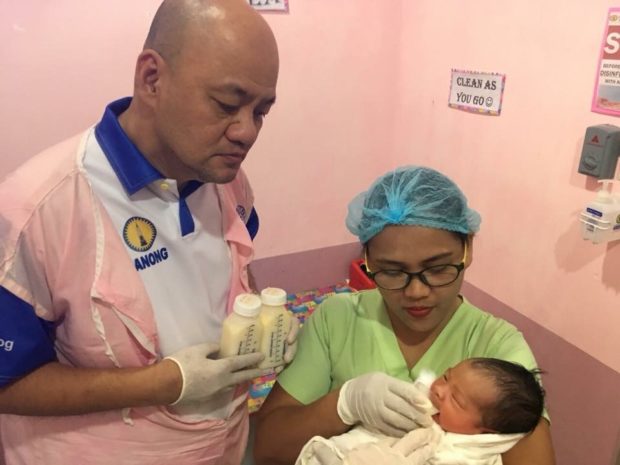Human milk banks pasteurize breast milk to save lives in PH

A baby receives human milk pasteurized in the Human Milk Bank (HMB) facility of Bicol Medical Center. The Rotary Club of Timog-Quezon City District 3780 donated the HMB facility to the hospital. (Photo by Rotary)
Around 100,000 Filipino children, including those affected by Supertyphoon Yolanda in 2013, have benefited from human milk bank (HMB) facilities established nationwide in the last five years.
More than half of these HMB facilities located in hospitals across the country were built through the initiative of various Rotary Clubs in the Philippines in partnership with the government.
“As we all know by now, breast milk has been proven clinically, and through studies, as best source of nutrition for infants due to its nutritional values since it also protects the immune system, promotes neurodevelopment, among others,” noted Rene Canlas, president of Rotary Club of Timog-Quezon City.
“Human milk is indeed life-saving and HMBs could boost public health initiatives of the government, as human milk could even be part of emergency response efforts, including when disaster strikes,” Canlas said.
An HMB is a service facility that collects, screens, process, stores, and distributes donated human milk to meet the specific needs of individuals for whom human milk is prescribed, the rotary said.
Article continues after this advertisementHuman milk offers undeniable benefits to preterm babies as well as critically ill newborns afflicted with necrotizing enterocolitis, feeding intolerance, immunodeficiency diseases, allergies, and inborn errors of metabolism, among others. These babies who are admitted in the neonatal intensive care units of hospitals are in dire need of nutrients, the Rotary said.
Article continues after this advertisementBut, the rotary noted, benefits of breast milk or pasteurized human milk are not only limited to infants. It also helps adult patients suffering from Hemolytic anemia and cancer.
Serendipity
The Rotary’s involvement in the establishment of HMBs in the Philippines was sort of a “fortunate accident,” according to Rene Cantos, past president of the Rotary Club of Timog.
It was during Cantos’ term and the leadership of past district governor, Francis Rivera, of Rotary International District 3780, that the club’s first venture into the pasteurization of donated human milk was launched.
“In 2013, we were eyeing water projects for far-flung areas in the country. I had an agreement with a counterpart from (South) Korea for a water project but the team could not find exactly where to set up such project here at that time,” Rivera recalled.
“Until the late Dr. Cindy Paderna, better half of our Past President Francis Paderna, recommended that we visit Dr. Jose Fabella Memorial Hospital (DJFMH). This led the start of HMB project for Rotary,” Rivera added.
“We, a group of all-male members, never really thought about venturing into this,” Rivera pointed out.

Rotary Club of Timog-Quezon City District 3780 President Rene Canlas watches as a nurse in the Human Milk Bank facility in Bicol Medical Center gives pasteurized human milk to an infant. (Photo by Rotary)
The Rotary Club of Timog-QC District 3780’s partnership with the Rotary Club of Daejeon District 3680 of South Korea led to the donation of a pasteurizer to the DJFMH through a global grant in November 2013.
“So, this started it all–the passion of our Rotary International District 3780 to help save infants’ lives by expanding HMB capacity in the country by donating HMB facilities to government-owned hospitals,” Rivera said.
“In fact, our model for this project is being replicated in other districts in the country and even by clubs abroad, including those in India,” he also said.
The Rotary Club of Timog-QC has so far donated five HMB facilities throughout the Philippines. In all, however, the different Rotary organizations in the country have established 11 HMB facilities nationwide with investments reaching around US$833,500.
Canlas said this amount excludes the US$60,000 cost of training that members of the HMB committee, including five doctors and a nurse, attended in the United Kingdom.
To date, a total of 20 HMB facilities are established in various hospitals in the Philippines. These are:
1) DJFMH (Rotary Club-Timog)
2) University of the Philippines- Philippine General Hospital (not through Rotary grant)
3) Ospital ng Maynila Medical Center (Rotary Club Timog)
4) Philippine Children’s Medical Center
5) Justice Jose Abad Santos Memorial Hospital (Rotary Club Chinatown Manila)
6) Philippine Children’s Medical Center (Rotary Club Holy Spirit)
7) Quezon City General Hospital (not through Rotary grant)
8) East Avenue Medical Center (Rotary Club Pearl of the Orient)
9) The Medical City (not through Rotary grant)
10) Taguig-Pateros District Hospital (not through Rotary grant)
11) Saint Luke’s Medical Center – Global in Taguig City (not through Rotary grant)
12) Batangas Medical Center (Rotary Club District 3780)
13) Bicol Medical Center in Naga City (Rotary Club Timog)
14) Jose Lingad Regional Medical Center in Pampanga (Rotary Club Timog)
15) Cagayan Valley Medical Center (Rotary Club Timog)
16) Dr. Vicente Sotto Medical Center in Cebu City (not through Rotary grant)
17) Western Visayas Medical Center in Iloilo (Rotary Club District 3780)
18) Doctors’ Hospital in Bacolod City (Rotary Club Bacolod District 3860)
19) Eastern Visayas Regional Medical Center in Tacloban City (Unicef Project); and
20) Zamboanga City Medical Center (Unicef project)
Canlas revealed that an HMB in a hospital in Tuguegarao would be launched this April.
“Our goal now is to standardize the establishment and operation of HMB facilities nationwide. We plan to donate an HMB facility for each region so that every region in the country will have its own HMB facility, as we know how important human milk is in the survival of either full term or pre-term infants, and sick adults. We could save many lives here, through this project,” Canlas said. /jpv